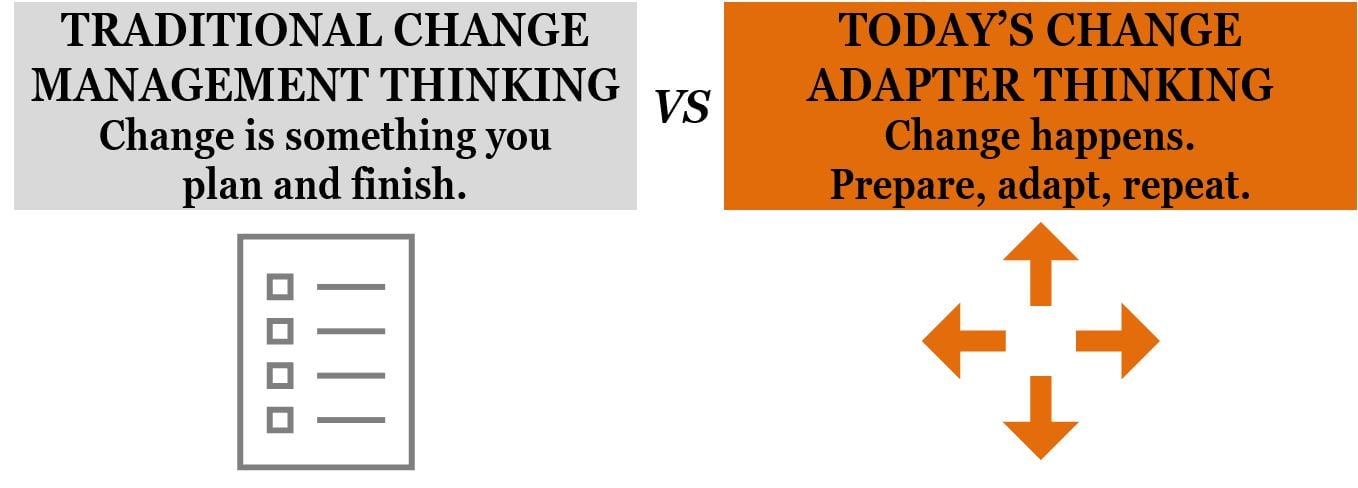As you look at your recipe and then at your motley collection of ingredients, you realize you are missing many required ingredients. No butter, but would the olive oil work instead? If ketchup is needed, and you have tomato sauce and vinegar, could you create the needed ingredient? How fast could an online delivery service come and is it worth the added cost? Perhaps you ignore it all and just order a pizza delivery. Or you give up and munch on a stale cracker until you have exactly the ingredients as listed. How would you deal with this situation? The ability to pivot effectively to evolving situations is one of today’s most sought after skill sets: adaptability.
On this page:

Not Your Grandmother’s Change
Change management is a methodology and a mindset that says “change” can be predicted, planned, communicated, and managed. And in some cases that is true. However, the global threat of Covid-19 quickly highlighted which organizations are trapped in traditional “we can manage all change” thinking and which have modern “change as a mindset” thinking. Close your door until business resumes or launch curbside pickup. Lay off all staff or quickly upskill to expand remote work.

How one views change applies as much to organizations as it does to individual Project Managers. When a personnel resource is suddenly not available, what is your next action – wait until their return or find a replacement? When a team member brings forward an alternative approach, do you talk thru the repercussions with them or shut it down immediately. Consider this analogy from Laurie Leinwand, a licensed professional counselor, quoted in a recent Washington Post article around change as a mindset:
“…change is like a rip current — if you swim against it, you’ll never reach the shore. “I advise people to ride change like a wave.
If you’re in a fall, a rise will follow.””
Traditional change thinking is weighed down by a forced rigidity; modern change thinking is heralded as innovative, adaptive, and forward thinking.
Studying for the PMP Exam?
Change Is Adaptability in Action
Change did not just appear on the scene with the pandemic; it has always been present. What did happen with the pandemic was an unparalleled breadth, scope, depth, and duration of change that impacted primary education, higher education, health care systems, family roles, governmental services, and businesses across industries. Creative solutions and the speed of activating new processes is the game changer in getting through the pandemic. How organizations respond to change is adaptability; that trait is also known as “adaptive thinking” in people.

One does not know your true mastery of adaptability until faced with truly unexpected change. Following the change plan is indicative of your ability to work to a defined set of instructions. As a professional skill, adaptability shines through in your speed and effectiveness in assessing and responding to unanticipated change.
What Fuels Adaptability as A Skill
As a leader of a team, Project Managers must model adaptability in how they react to change so that team members have a positive example for the changes that they will experience in their role. Project Managers should recognize that there are “messy emotion that come with resistance to change” and use different methods to motivate team members through a change. Consider this list of skills for Project Managers as they also are components of adaptive thinking:
|
Emotional intelligence |
Growth mindset |
|
Accountability |
Clear communications |
|
Problem solving |
Critical Thinking |
Growing your change mindset, or adaptive thinking skill, happens in part with training that focuses on people, not just templates and lists. “Humans instinctively sees change as potential danger until enough information proves otherwise, thus, Project Managers with soft skills are better prepared to lead a team through the unknown.
Adaptability as A Career Edge
Business publications and lead talent recruiting firms agree that adaptability is an edge in the pandemic times and beyond. From Forbes article “How to Approach Change Like a Skill vs An Event” comes this insight:
To set us up for success in this new world, we must embrace the fact that the only thing that guarantees our employment is a clear business need for the skills we’re offering.
Leading career development agency Robert Half highlights adaptability as a in demand skill that keeps you relevant, further:
Learning how to adapt to change is a soft skill that will not only make you a top candidate when applying for roles, but one that has the capacity to give you a renewed optimism about your work.
Being adaptable will increase your project success rates, give you an edge when advancing your career, and help in managing things back at home. Being able to adapt to change rather than resist it or pointlessly try to completely prevent it, can mean more opportunities and creative solutions. Be one with the change and enjoy the ride.
Upcoming PMP Certification Training – Live & Online Classes
| Name | Date | Place |


 New Horizons
New Horizons
 Project Management Academy
Project Management Academy
 Six Sigma Online
Six Sigma Online
 TCM Security
TCM Security
 TRACOM
TRACOM
 Velopi
Velopi
 Watermark Learning
Watermark Learning
 Login
Login




 New Horizons
New Horizons
 Project Management Academy
Project Management Academy
 Velopi
Velopi
 Six Sigma Online
Six Sigma Online
 TCM Security
TCM Security
 TRACOM
TRACOM
 Watermark Learning
Watermark Learning